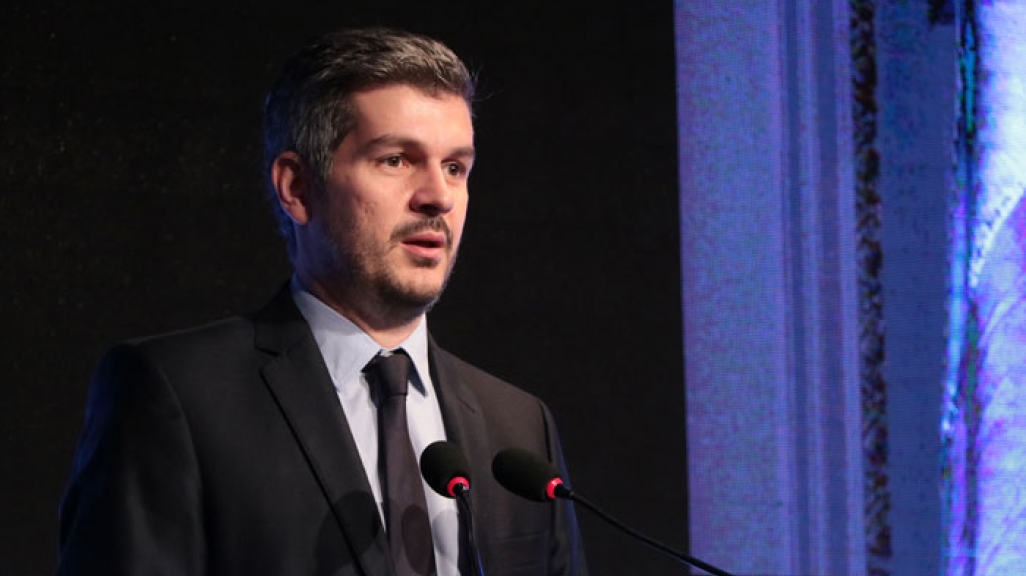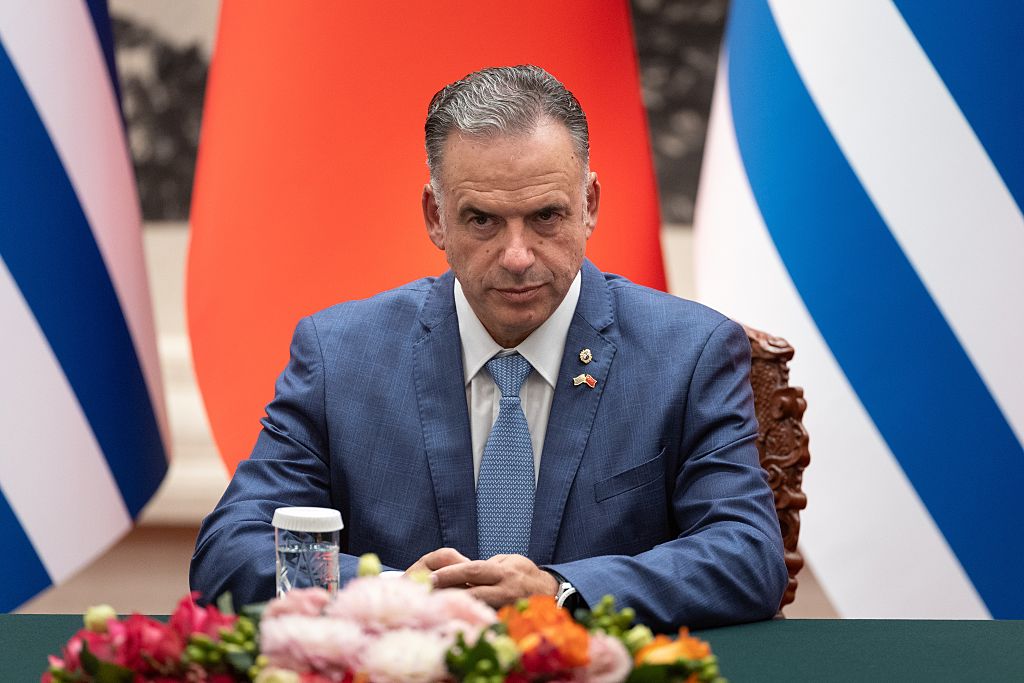#CouncilARG 2017 Recap: Argentina – Economic and Political Perspectives
#CouncilARG 2017 Recap: Argentina – Economic and Political Perspectives
Consolidating change in Argentina was one of the recurring themes of the conference, in which various members of President Mauricio Macri's cabinet participated.
Speakers:
- Marcos Peña, Chief of the Cabinet of Ministers
- Juan José Aranguren, Energy and Mining Minister
- Francisco Cabrera, Production Minister
- Nicolás Dujovne, Treasury Minister
- Andrés Ibarra, Modernization Minister
- Juan Manuel Abal Medina, Senator from Buenos Aires Province
- Luciano Laspina, Deputy from Santa Fe Province
- Rodolfo Urtubey, Senator from Salta Province
- Horacio Rodríguez Larreta, Mayor of the City of Buenos Aires (Download his presentation.)
- Francisco Alvarez-Demalde, Founding Partner, Riverwood Capital
- Andrés R. Martínez, Bureau Chief, Bloomberg L.P.
- Claudio Muruzabal, President, Latin America & The Caribbean, SAP
- Julia Pomares, Executive Director, Centre for the Implementation of Public Policies for Equity and Growth (CIPPEC) (Download her presentation.)
- Roberto Sifón Arévalo, Managing Director, Lead Analytical Manager of Sovereigns & Public Finance Ratings in Latin America, S&P Global Ratings
- Alejandro Werner, Director of the Western Hemisphere Department, International Monetary Fund (Download his presentation.)
- Susan Segal, President and CEO, Americas Society/Council of the Americas (Read her remarks.)
- Jorge Luis Di Fiori, President, Cámara Argentina de Comercio y Servicios
Lea un resumen del evento en español.
On August 24, AS/COA celebrated its fourteenth annual conference in Buenos Aires, this year discussing Argentina’s political and economic scenario ahead of October 22 legislative elections. “As one of the most important business events of the region, this gathering comes at the optimal moment to invest in Argentina and boost its development,” said the President of Argentina’s Chamber of Commerce Jorge Luis Di Fiori in his opening remarks. Di Fiori took note of the country’s progress in stabilizing the economy since the election of President Mauricio Macri, insisting that this “normalization” must now be coupled with a complete and lasting transformation.
"Estamos frente ante una oportunidad única para llegar a la unión cómo país. Es nuestro trabajo aprovecharla"Jorge Luis Di Fiori #CouncilARG pic.twitter.com/tp5tLtwHhc
— CAC (@CACteinforma) August 24, 2017
AS/COA’s President and CEO Susan Segal followed Di Fiori and discussed her own experience witnessing the country’s vast improvements since a 2006 trip she took to Argentina with a group of skeptical investors. With Macri in the presidency, “Argentina has become an example of how consistent policies can benefit a country,” she said, highlighting its return to global markets and its consolidation as Latin America’s entrepreneurial hub.
En el 14vo #CouncilARG @s_segal Argentina se consolida en Entrepreneurship pic.twitter.com/AhwaGhvYkz
— Majo Perez Dorrego (@majopd) August 24, 2017
Buenos Aires Mayor Horacio Rodríguez Larreta then took the stage to speak about the capital’s investments in public works, particularly in education. “Education is what will define the future of our country,” he said before a packed audience, highlighting the 65 new schools built, and plans to incorporate technology more widely in both teacher training and students’ curriculum. These changes are taking place as the national government seeks to expand preschool to ages 3 and 4.
#CouncilARG | Habla Horacio Rodríguez Larreta: "Tenemos que apostar muy fuerte a cambiar el sistema educativo" https://t.co/G2oLOzOLip pic.twitter.com/0CgKL3G16z
— infobae (@infobae) August 24, 2017
The opening segment of the conference concluded with Macri’s Cabinet Chief Marcos Peña, who also described the transformation of the country and the renewed confidence in its democratic institutions.
.@marquitospena: “Estamos cambiando la cultura democrática de nuestro país”https://t.co/XClZCgp5Xm#CouncilARG pic.twitter.com/ldOO55brRY
— El Economista (@El_Econ) August 24, 2017
Acknowledging that Argentina still faces high inflation and unemployment numbers, Finance Minister Nicolás Dujovne asked the private sector be patient and to have confidence in the government’s attention to on the economy, which just saw four consecutive quarters of economic growth. Dujovne outlined drastic macroeconomic changes the Macri administration implemented, such as a floating exchange rate, and said the government is promoting tax reform to boost job generation in the private sector, as well as a new fiscal resonsibility project. “To have stability, we need to have solvency,” Dujovne said.
#CouncilARG Nicolás Dujovne pidió a los empresarios que acompañen y tengan pacienciahttps://t.co/qZhkA8O7hV pic.twitter.com/cYx7lSVywe
— Clarín (@clarincom) August 24, 2017
Potential is also what International Monetary Fund (IMF) Director of the Western Hemisphere Department Alejandro Werner sees when looking at Argentina’s economic restructuring. Werner, in his first apperance at the Buenos Aires event, gave an overview of global economic growth and Argentina’s position (projected to grow 2.4 percent in 2017) in relation to other emergent markets and Latin America. Argentina is a special example for other countries in that it has a “clear strategy to stimulate investment, which is rare among emergent markets,” Werner said. To increase investments planned for more than 10 years, Werner said, the country needs to continue the fiscal adjustments gradually.
#CouncilARG Para el FMI, Argentina es el país con más proyección de la región | Por @ldelucila https://t.co/8mg8NpffFp pic.twitter.com/doXWgWQl6s
— Cronistacom (@Cronistacom) August 24, 2017
Next, Production Minister Francisco Cabrera outline government measures to increase economic productivity, in particular boosting its ties to global markets. He reaffirmed the importance of Mercosur, and said Argentina is interested in pursuing free-trade agreements with the European Union and the United States. The minister also discussed areas Argentina could potentially compete internationally, such as biodiesel and manufacturing. “We believe we can compete and be the best in manufacturing. There are no doubts about Argentines’ capability to compete,” said Cabrera.
#CouncilARG Cabrera confirmó que pedirán a EEUU “rever” aranceles al biodiesel https://t.co/WmBxxcyOyT pic.twitter.com/hFeiqYC1Ci
— LETRA P (@Letra_P) August 24, 2017
At the moment, Argentina’s economic growth depends most upon its political stability—and Macri’s coalition, Cambiemos, is gaining political momentum, said Bloomberg’s Andrés Martínez, who moderated a panel of economists and investors. Roberto Sifón Arevalo of S&P Global Ratings emphasized how institutional stability is an important factor in a country’s sovereign rating as well. He said S&P was closely watching inflation—which could be halved again from 22 percent to 10-15 percent if the current performance keeps up—as well as a 3 percent potential GDP growth in the short-term. This is the time to invest in Argentina because there will be more technological advances in the next three years than there were in the previous 20, said SAP’s Claudio Muruzabal. Panelists also underscored the economic importance of training the next generation of workers in Argentina. “The infrastructure of tomorrow is education and skills training,” said Francisco Alvarez-Demalde of Riverwood Capital.
Tecnología nivela "la cancha de juego" para la competitividad de empresas de todos tamaños - @cmuruzabal en #CouncilARG pic.twitter.com/qGzQceSDGE
— SAP Noticias LAC (@SAPNoticiasLAC) August 24, 2017
Argentina’s Minister of Energy and Mining Juan José Aranguren presented on a variety of projects through which the country is working to wean itself off a dependence on imported liquefied natural gas and diversify its energy sources. One of those projects is the RENOVAR program, which aims to have 20 percent of Argentina’s energy matrix coming from renewables by 2025.
Minister Aranguren shows plans for #Argentina's energy matrix. #CouncilARG https://t.co/mfQZ5dhYFu pic.twitter.com/13uFInCvKx
— AS/COA Online (@ASCOA) August 24, 2017
The country is also focused on boosting development through digital inclusion and via the current internet penetration rate of 65 percent, said Andrés Ibarra, the minister of modernization, who presented next. More than 200 Argentine municipalities have free public wifi hotspots now, and there are 300 digital centers in the country. After years with no official data, the government is especially focused on transparency and creating a database to make this information publicly available, he said.
En #CouncilArg contando lo que estamos haciendo por un Estado al servicio de la gente. Pueden seguirlo en vivo acá: https://t.co/kZ0Uv84kDM pic.twitter.com/oZ3Wl37GxN
— Andrés Ibarra (@andreshibarra) August 24, 2017
The second panel of the day, moderated by Julia Pomares of the think tank CIPPEC, discussed the government’s legislative agenda and included three congressmen, two of whom are running for reelection on October 22. One top agenda item is tax reform, necessary to boost economic growth while also tackling Argentina’s large fiscal deficit. For the Santa Fe Deputy Luciano Laspino, Argentina needs to reduce tariffs on trade to boost the country’s exports. Buenos Aires Province Senator Juan Manuel Abal Medina said tax reform should not focus on cutting taxes but on administering them more equally and efficiently, incorporating Argentina’s informal economy into the system. Salta Senator Rodolfo Urtubey, on the other hand, thinks the way to rev up Argentina’s economy is via tax cuts to the most productive sectors so as to not stifle businesses.
Pares also challenged the congressmen to address the country’s high child poverty rate, which is 47.1 percent for Argentines 17 or younger in comparison the country’s overall poverty rate of 27.4 percent. The issue should be tackled with legislation targeted specifically to that age group rather than tackling poverty as a whole, suggested Urtubey. The other panelists called for a commitment to incorporate segments of society that are typically left out into the school system, pointing to the government’s preschool reform as an example of one way to do that.
[VIVO] #LucianoLaspina habla de la #ReformaTributaria en el Consejo de las Américas #CouncilARG https://t.co/Hhi7SpGDGI pic.twitter.com/YzX6grqe2m
— Cronistacom (@Cronistacom) August 24, 2017








